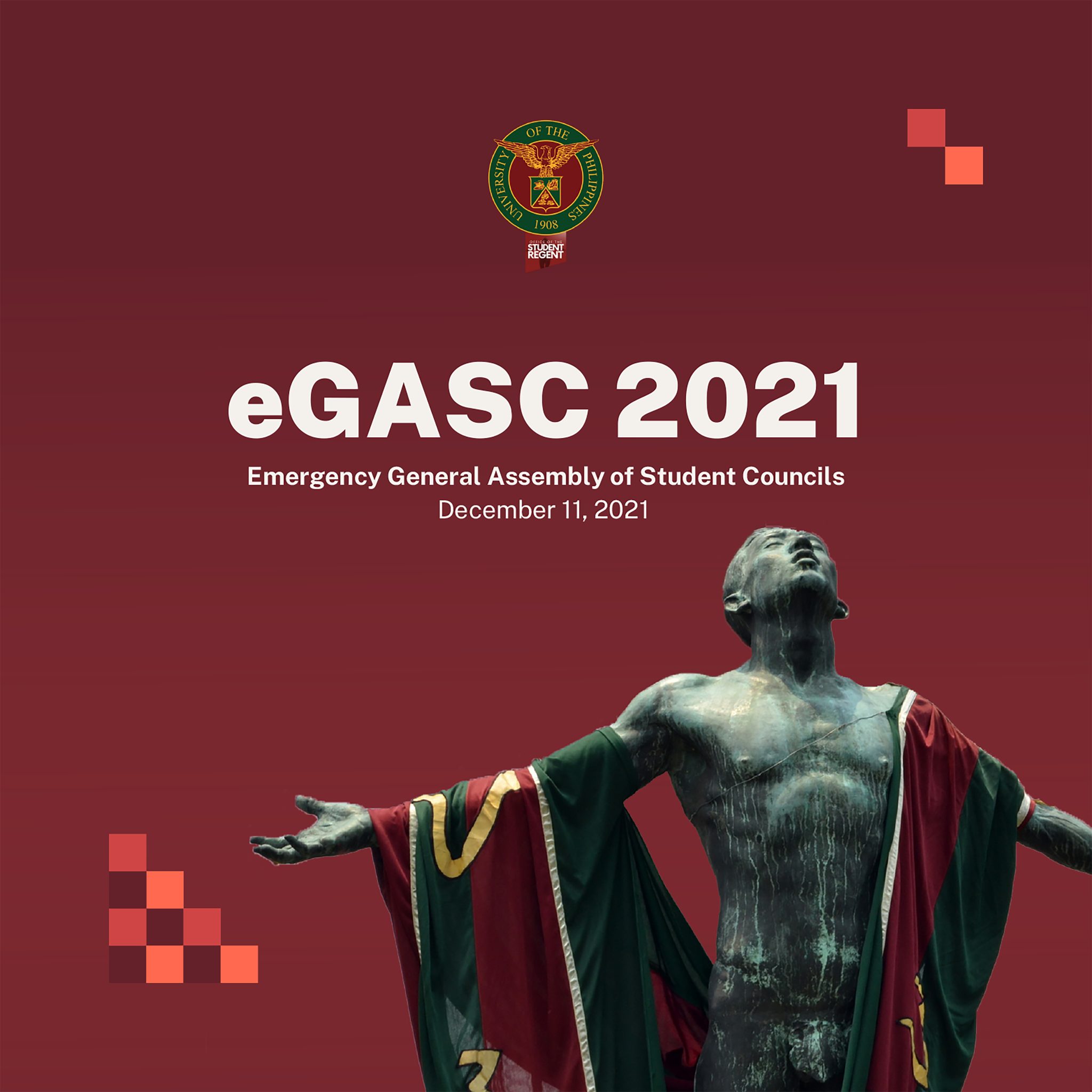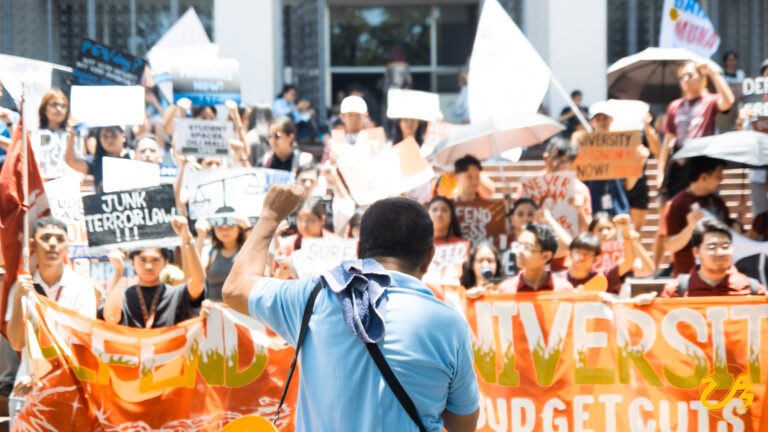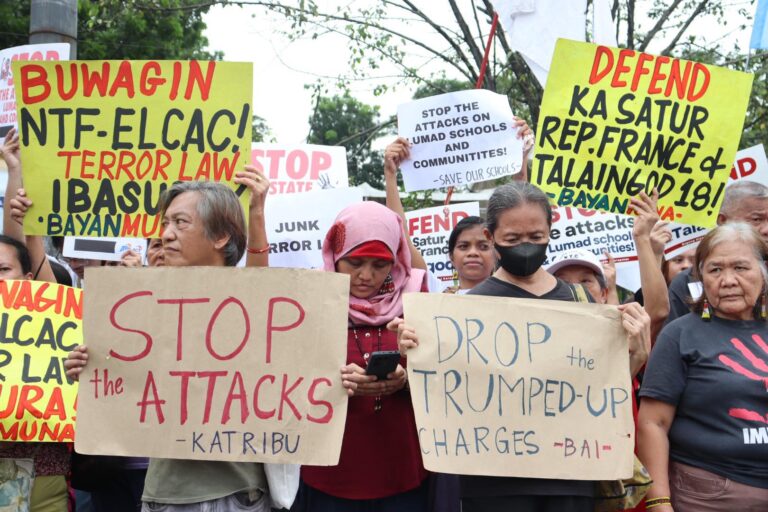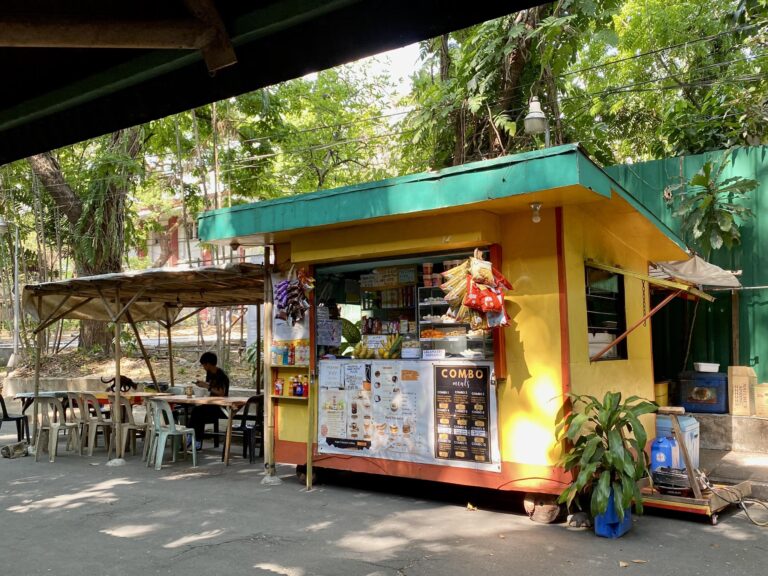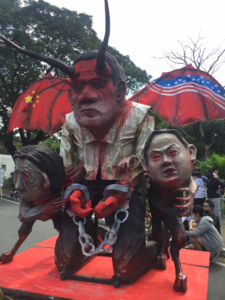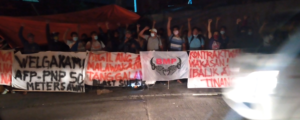
Fifty student councils across the University of the Philippines (UP) System and the Office of the Student Regent (OSR) convened the emergency General Assembly of Student Councils (eGASC) last December 11, Saturday, via Zoom.
Four resolutions were adopted seeking to extend the term of office of Student Regent Renee Co, defend UP and its academic freedom, conduct the 52nd GASC on-ground, and push for a genuine and safe re-opening of UP campuses.
On December 3, through Memorandum RMLC 2021-07, the OSR called for an eGASC “to consolidate and discuss urgent matters for our democratic rights and fight for the Filipino people.”
It primarily discussed two urgent matters, namely the constituent unit updates and the deliberation of proposed resolutions to the GASC body.
Constituent units, conditions, and campaigns
Common grievances were reported by constituent units. The reports shared a common concern on the resumption of face-to-face classes, cases of state attacks, and local student concerns.
UP Baguio presented the results of their survey on remote learning and concluded that the majority of the students expressed their difficulties due to heavy academic workload. The UPB administration has not yet applied for limited F2F classes, despite prevailing conditions and having only four out of five students vaccinated.
They also reported the forum hosted by the Cordillera Regional Task Force to End Local Communist Armed Conflict (RTF-ELCAC) and Commission on Higher Education (CAR) where student organizations and leaders were red-tagged and surveilled by state forces
Meanwhile, UP Cebu notified the body that their administration has approved the creation of an ad hoc committee that will focus on the return of limited physical classes, the on-going revision of student handbook, and the on-going UPC chancellor selection and efforts to lobby student campaigns.
They also shared updates on the formation of an alliance against budget cuts on education.
For the 2022 national budget, the Budget department proposed a P1.3-billion budget cut but a Senate proposal sought to add a P2-billion budget to the university.
Despite budget cuts, the UP Diliman contingent reported that two other colleges applied for limited physical classes, namely the College of Architecture and CSSP. They add to the six colleges which initially applied.
Diliman also shared an update on the formation of various alliances such as the No to Marcos-Duterte campaign, press freedom alliance Malaya UPD, and SOGIE and gender rights alliance UP KASARIAN.
The UP Los Baños council reported that the student councils have been campaigning for the students’ demands during remote learning and representing students in UPLB university committees. With a high vaccination rate and complete roadmap, they said that the UPLB administration is just waiting for the CHED approval on limited face-to-face classes.
As for UP Manila, the much-criticized Return Service Agreement is undergoing a review. Majority of the students do not agree with the RSA saying that it is vague, coercive, repressive, and a deprivation of the right to education. Students also regard the agreement has many loopholes, a form of commercialization of education, is ineffective in mobilizing students for nation-building, and a merely “band-aid solution” to the nation’s brain drain.
Out of all the eight constituent units, UP Manila is the first to conduct limited physical classes. Five colleges now hold face-to-face classes while two others have not.
UPM students who belong to the two colleges are calling for inclusive policies on the safe resumption of physical classes.
Andrea Alipio, an official of the National Union of Students of the Philippines (NUSP) and a student of UPM College of Arts and Sciences, laments the exclusion of CAS saying that the “largest in size yet arguably the most deprived of physical, democratic, and academic spaces.” Alipio further the college has been on the “receiving end of unresponsiveness and inaction.”
The psychological effect of the remote set-up also intensified. In UP Mindanao, many council officers have resigned from their positions due to fatigue and mental health reasons, hence asserting the creation of a PsycServ facility.
The PsycServ is an initiative of the UPD Office of the Chancellor to provide free psychosocial services to students in need of professional help.
However, PsycServ has been plagued with problems that have been compounded by the impending budget cut. A glaring issue is the mismatch between the high demand for their service as compared to only 14 contractual staff.
In this regard, the CSSP SC filed a resolution last 51st GASC calling for the institutionalization of PsycServ to provide more institutional measures to alleviate its difficulties.
Like UP Cebu, UP Mindanao is also in the process of chancellor selection and has already forwarded their demands and campaigns to the candidates. As for their Ligtas na Balik-Eskwela committee, they said that the student representation has stopped and no updates have been given as of November.
Lastly, UP Visayas said that they have now crafted a ligtas na balik eskwela roadmap that is now being consulted with various sectors of their unit. Their constituents raised issues on specific guidelines on the conduct of classes, housing and accommodations, financial issues, and security concerns.
UPV students are not spared from red-tagging after the provoking 2019 performance by the UPV Skimmers, critical of the Duterte administration, which gained the irk of the dictator’s die-hard supporters. Officials of the RTF-ELCAC Region 6 also entered the campus grounds last November and cases of red-tagging have been recorded such as the cases of Pagbutlak’s adviser Prof. Tomas Talledo and student leaders.
Resolutions as ‘campaign shifts’
Aside from constituent unit reports, the eGASC also passed four resolutions. SR Co reminded the councils that the resolutions passed today are “important campaign shifts” that they have to lead with the students in the upcoming months.
The first resolution, Resolution 2021-29, sought to extend the term of the office of Student Regent Co. The resolution’s co-authors highlighted the need to align the terms of councils and the regent to effectively lead the campaigns within the school year.
The terms have been out of sync as Co’s predecessor, SR Isaac Punzalan, has been granted a hold-over term in August 2020 until January 2021. Co assumed office in January 2021 and is set to be replaced in January 2022, as per the UP Charter which states that the SR has a one-year term only.
Co’s holdover capacity will be until her successor is chosen on the 53rd GASC. The selection will still follow the process per the Codified Rules for the Student Regent Selection, nominations open in the Second Semester of AY 2021-22 and the GASC will convene before the start of the First Semester of AY 2022-2023. With this, the term of the 39th regent coincides with the term of student councils.
However, the proposal for Co’s term extension has legal jurisprudence. Punzalan’s term extension supports the current calls for a hold-over term beyond January 2022. The proponents also resolved that the student regent selection process is a sole student matter which other sectors can intervene in.
The second resolution, Resolution 2021-30, calls for defending the University of the Philippines and upholding academic freedom.
Proponents used the unilateral abrogation of the UP-DND Accord, immense campus militarization and state attacks, and the current legislative campaign to institutionalize the accord as sufficient rationale which they say SR Co was able to lead during her term.
Defend UP Network commended SR Co’s efforts and her legislative knowledge in handling the proposed bills to institutionalize the Accord to the UP Charter. In the House of Representatives, the bill has been passed on Third Reading but was held back by pro-NTF-ELCAC Rep. Boying Remulla’s motion for reconsideration. The bill remains at the committee level in the Senate.
The resolution also demands that a similar bill to uphold academic freedom be applied not only in UP but in all state universities and colleges (SUCs) and higher education institutions (HEIs).
The third resolution, Resolution 2021-31, proposes the conduct of an on-ground 52nd GASC while providing an option to attend online for those who cannot or opt not to go physically. Proponents argued the need for a physical convention since conditions have given leniency in providing face-to-face gatherings. In a survey by the OSR, 30 councils approved the on-ground GASC while 6 others did not.
The fourth resolution, Resolution 2021-32, pushes for a “genuine and safe re-opening of UP campuses.”
As the CHED allowed the limited face-to-face classes in areas under Alert Level 2, all UP campuses have started to prepare their own ligtas na balik eskwela roadmaps. In UP Diliman, Chancellor Nemenzo approved UPD’s roadmap but USC Chair Jonas Abadilla called out the lack of student consultation. Abadilla maintained that students are open to discuss plans with the administration.
Proponents of the resolution highlighted that the dire state of remote learning stems from the Duterte administration’s criminal negligence.
According to the World Health Organization, schools should be the first to open and last to close. But in the Philippines, the schools were the first to close and the last to open. As of December, less than one percent of schools have implemented limited physical classes.
#LigtasNaBalikEskwela
#DefendUP
#eGASC2021
Featured image courtesy of UP OSR.

